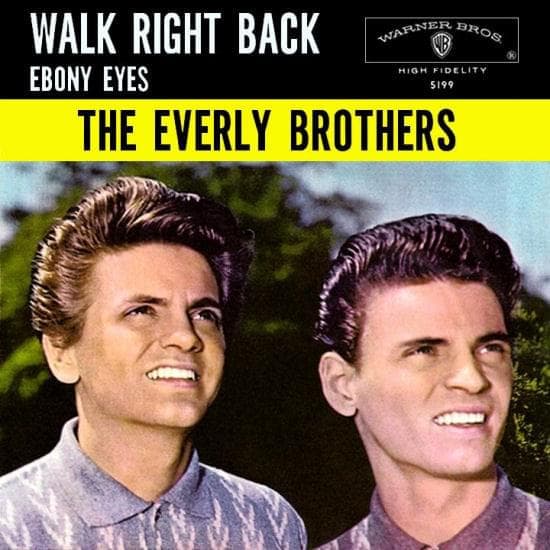
A Tragic Ballad That Turns Young Love Into an Eternal Memory
When The Everly Brothers released “Ebony Eyes” in early 1961 paired on a double-sided single with “Walk Right Back” the record soared across the charts, reaching No. 1 in the United Kingdom and securing a strong presence on the U.S. listings during a period when the duo were already among the most defining voices of post-war American pop. Though not tied to a specific studio album at its release, the song stands as one of the most haunting entries in their catalog, a dramatic counterpoint to the smoother, harmony-rich hits that had carried Don and Phil Everly to international acclaim.
What gives “Ebony Eyes” its enduring gravity is not the placement of the harmonies or the polish of the production, but the starkly narrative structure a spoken-word tragedy rendered with an almost cinematic sense of pacing. At its core, the song belongs to a long lineage of “teen tragedy” ballads popular in the late 1950s and early 1960s, yet The Everly Brothers approached the form with an elegance that elevates it far above the sensationalism that sometimes defined the genre. Instead of melodrama, they offer restraint; instead of shock, they offer quiet devastation. The aircraft disaster at the center of the story never becomes spectacle. It remains, instead, a deeply personal catastrophe: one young man waiting for the woman he loves, unaware that her final journey has already slipped beyond the realm of the living.
The spoken interlude delivered with a trembling dignity serves as the emotional fulcrum of the entire recording. The narrator reads the telegram informing him of the crash, and in that moment, the orchestration thins, as though the entire world is holding its breath. It is one of those rare pop moments when performance becomes a vessel for grief as pure as anything in traditional folk music. The Everly Brothers were known for their seamless vocal blend, yet here they rely on a single voice, naked and unguarded, to carry the full weight of the narrative. It is a testament to their versatility, and to their understanding that harmony, no matter how beautiful, is not always the language of sorrow.
Lyrically, the song speaks to a fear deeply rooted in the cultural climate of its era. Commercial air travel had only recently become widespread, and stories of tragic crashes often occupied headlines. Into this atmosphere came a ballad that channeled both the anxiety of a rapidly modernizing world and the timeless ache of unexpected loss. Still, “Ebony Eyes” is not merely a period piece. Its emotional force endures because it captures a universal truth: love is vulnerable precisely because it is precious.
Across generations, listeners have returned to this recording not for catharsis alone, but for the quiet grace with which it confronts heartbreak. “Ebony Eyes” remains one of The Everly Brothers’ most powerful performances a reminder that even in their polished, harmony-laden universe, they understood how to give tragedy a voice as gentle, and as unforgettable, as a final whispered farewell.